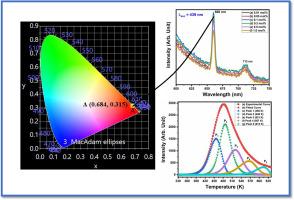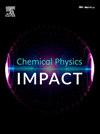Structural and luminescence properties of Y2O3:Ho3+ phosphor: Potential applications in plant cultivation LEDs and thermoluminescent dosimetry
IF 4.3
Q2 CHEMISTRY, PHYSICAL
引用次数: 0
Abstract
Current research on Y2O3:Ho3+ phosphors highlight their promising luminescence properties, but often lacks an environmentally friendly synthesis method and comprehensive analysis of their applications. In this study, we address these gaps by successfully synthesizing Y2O3:Ho3+ phosphors using a green synthesis route with varying concentrations of Ho3+. Our work provides detailed characterization of their photoluminescence (PL) and thermoluminescent (TL) properties. The PL excitation (PLE) spectra reveal a distinct peak at 439 nm, attributed to the 5I8→(5K5; 5G5) transition of Ho3+ions. Upon excitation at 439 nm, the emission spectra show a sharp emission peak around 660 nm from the 5F5→5I8 transition, with the 0.1 mol% Ho3+ phosphors exhibiting particularly strong red emission, indicating their suitability for indoor plant cultivation under LED lighting. Additionally, TL properties were evaluated after gamma-ray exposure, with the highest emission intensity at 0.1 mol% Ho3+ concentration. TL glow curves were analyzed for various radiation doses using the Computerized Glow Curve Deconvolution (CGCD) method, and TL trapping parameters were determined through Chen's peak shape and the Initial Rise methods. This work demonstrates significant potential for using these phosphors to enhance indoor plant growth and for applications in thermoluminescent dosimetry (TLD).

Y2O3:Ho3+荧光粉的结构和发光特性:在植物栽培 LED 和热释光剂量测定中的潜在应用
目前有关 Y2O3:Ho3+ 磷光体的研究凸显了其良好的发光特性,但往往缺乏环境友好型合成方法及其应用的全面分析。在本研究中,我们采用绿色合成路线,利用不同浓度的 Ho3+ 成功合成了 Y2O3:Ho3+ 荧光粉,从而弥补了这些空白。我们的工作详细描述了它们的光致发光(PL)和热致发光(TL)特性。光致发光激发(PLE)光谱在 439 nm 处显示出一个明显的峰值,该峰值归因于 Ho3+ 离子的 5I8→(5K5; 5G5) 转变。在 439 纳米波长的激发下,发射光谱显示出 5F5→5I8 转变产生的 660 纳米波长左右的尖锐发射峰,其中 0.1 摩尔%的 Ho3+ 磷光体显示出特别强烈的红色发射,表明它们适合在 LED 照明下进行室内植物栽培。此外,还对伽马射线照射后的 TL 特性进行了评估,0.1 摩尔% Ho3+ 浓度时的发射强度最高。使用计算机化辉光曲线解卷积(CGCD)方法分析了各种辐射剂量下的 TL 辉光曲线,并通过 Chen 峰形和初始上升方法确定了 TL 捕获参数。这项研究成果证明了这些荧光粉在促进室内植物生长和热释光剂量测定(TLD)应用方面的巨大潜力。
本文章由计算机程序翻译,如有差异,请以英文原文为准。
求助全文
约1分钟内获得全文
求助全文
来源期刊

Chemical Physics Impact
Materials Science-Materials Science (miscellaneous)
CiteScore
2.60
自引率
0.00%
发文量
65
审稿时长
46 days
 求助内容:
求助内容: 应助结果提醒方式:
应助结果提醒方式:


